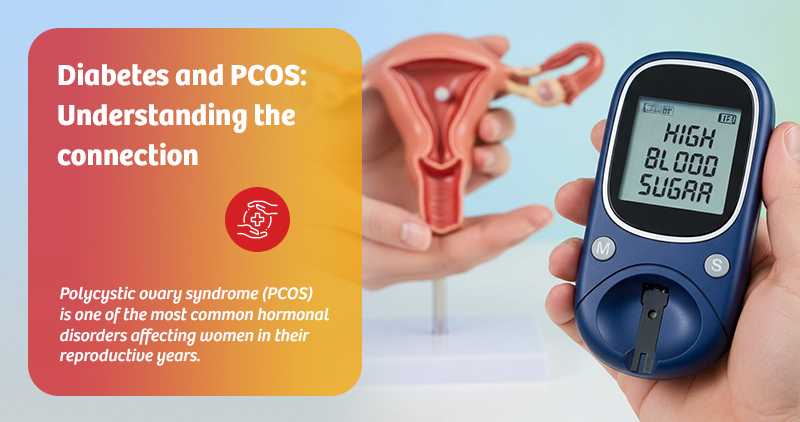

By Dr Ankita Jain
Consultant Obstetrician and Gynaecologist
Oct 05, 2025
Polycystic ovary syndrome (PCOS) is one of the most common hormonal disorders affecting women in their reproductive years. It is often associated with irregular periods, unwanted hair growth, acne, and weight gain. However, one of the most serious long-term risks of PCOS is diabetes.
Studies show that women with PCOS are up to four times more likely to develop type 2 diabetes compared to women without the condition. The primary culprit behind this connection is insulin resistance, a condition where the body’s cells don’t respond adequately to insulin.
We emphasise not only reproductive health but also the metabolic health of women with PCOS to prevent complications such as diabetes.
PCOS (Polycystic ovary syndrome) is a hormonal imbalance that affects the ovaries and metabolism. Its exact cause remains unclear, but genetic, hormonal, and lifestyle factors contribute.
The underlying problem in PCOS is INSULIN RESISTANCE.
Insulin is a vital hormone that regulates and maintains blood sugar levels in the body.
Insulin helps the body’s cells absorb glucose (sugar) from the blood. In insulin resistance, the body’s cells do not respond effectively to insulin, forcing the pancreas to produce more insulin to maintain normal blood sugar levels.
In PCOS, high insulin levels trigger the ovaries to produce excess male hormones (androgens), which in turn interfere with the production of female hormones & disturb the menstrual cycles.
Prolonged insulin resistance gradually leads to prediabetes & early onset of type 2 diabetes mellitus - sometimes in their thirties.
Even women with PCOS who are not overweight may still have insulin resistance. That is why screening and early lifestyle intervention are crucial.
Women with PCOS are 2–3 times more likely to develop diabetes in pregnancy, which can turn into type 2 Diabetes Mellitus if lifestyle changes are not practised post-delivery.
PCOS itself has symptoms, but diabetes may bring additional warning signs such as
At KD Blossom, women with PCOS are routinely monitored for these warning signs to ensure early detection of diabetes.
For women with PCOS, regular screening is a must.
Experts recommend screening women with PCOS at diagnosis and repeating every 1–3 years, depending on risk.
If ignored, PCOS combined with diabetes can lead to
Comprehensive PCOS care at KD Blossom looks beyond fertility—it ensures holistic women’s health and metabolic wellness.
1. Lifestyle modifications
2. Medical treatment
3. Regular monitoring
Living with PCOS and diabetes risk can be stressful. Counselling, support groups, yoga and mindfulness can help women manage emotional challenges.
Our multidisciplinary team ensures that women with PCOS are supported at every stage—from diagnosis to prevention of long-term complications like diabetes.
The risk of diabetes due to PCOS is real, but it is not inevitable. With the proper care and guidance, women with PCOS can maintain good health, preserve fertility and live with confidence.
Simple steps for better health
1. Can PCOS cause diabetes?
Yes. Women with PCOS have higher chances of developing prediabetes, type 2 diabetes, and gestational diabetes due to insulin resistance.
2. How can I prevent diabetes if I have PCOS?
A healthy diet, exercise, weight control, and regular check-ups are key preventive strategies.
3. Does every woman with PCOS develop diabetes?
Not necessarily. With timely lifestyle changes and medical care, the risk can be significantly reduced.
4. Should women with PCOS get regular diabetes tests?
Yes. Regular screening with OGTT, HbA1c, and fasting glucose tests is essential, particularly for women who are overweight or planning a pregnancy.
PCOS is more than a reproductive disorder—it is a metabolic condition with lifelong implications. One of the risks is diabetes, but with early screening, lifestyle changes, and proper treatment, it can be managed. The risk can be minimised.
At KD Blossom, we focus on empowering women to take charge of their health—helping them manage PCOS, prevent diabetes, and live healthier, happier lives.